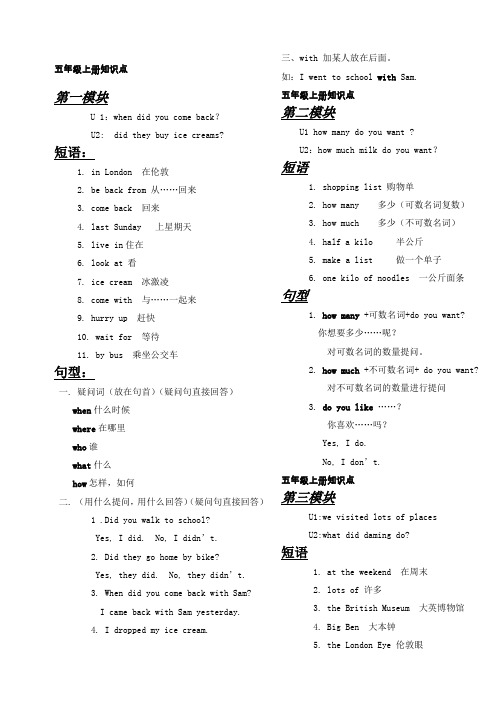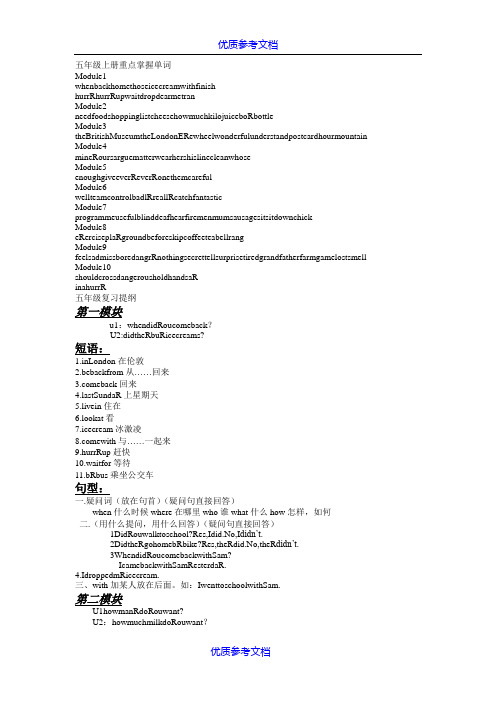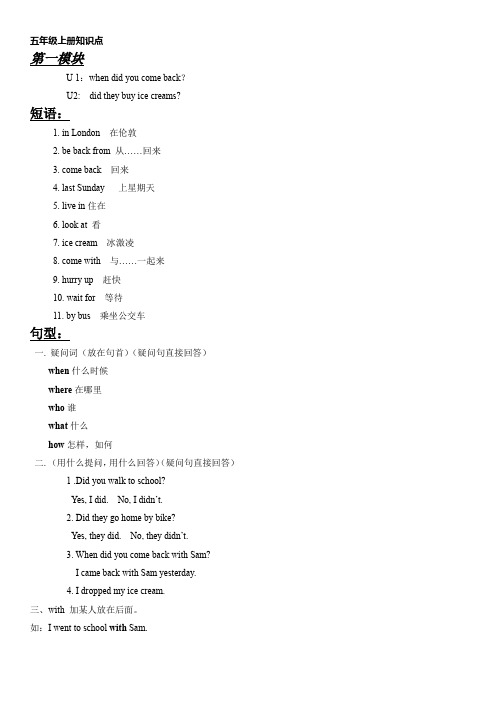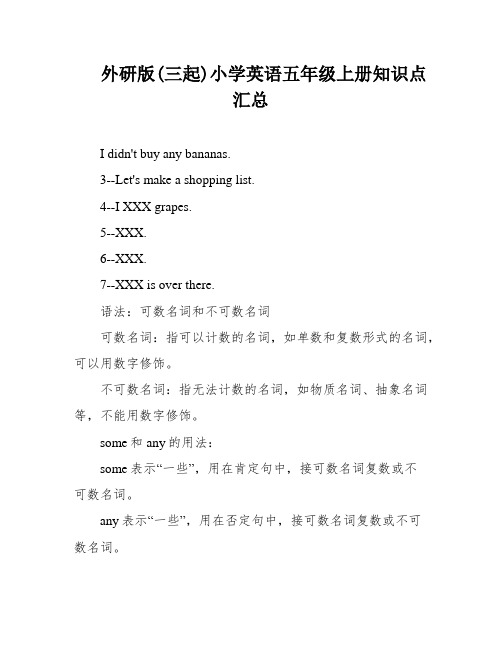外研社三年级起点五年级英语上册知识点
外研版三年级起点五年级上册知识点

外研版三年级起点五年级上册知识点一、单词。
1. 描述人物的单词。
- old(年老的),young(年轻的),funny(滑稽的;可笑的),kind(体贴的;慈祥的;宽容的),strict(要求严格的;严厉的)。
- 例如:My grandma is old.(我的奶奶年老了。
)- My English teacher is strict.(我的英语老师很严格。
)2. 星期单词。
- Monday(星期一),Tuesday(星期二),Wednesday(星期三),Thursday (星期四),Friday(星期五),Saturday(星期六),Sunday(星期日)。
- 注意首字母大写。
例如:We have English on Monday.(我们星期一有英语课。
)3. 食物单词。
- sandwich(三明治),salad(蔬菜沙拉;混合沙拉),hamburger(汉堡包),ice cream(冰淇淋),tea(茶;茶水)。
- I like sandwiches.(我喜欢三明治。
)- She doesn't like ice cream.(她不喜欢冰淇淋。
)4. 学科单词。
- English(英语),maths(数学),Chinese(语文),science(科学),PE (体育),music(音乐),art(美术)。
- We have science and art on Tuesday.(我们星期二有科学和美术课。
)二、短语。
1. 描述人物的短语。
- be helpful(有用的;愿意帮忙的),be hard - working(工作努力的;辛勤的)。
- He is helpful at home.(他在家很乐于助人。
)- My sister is hard - working.(我的姐姐很勤奋。
)2. 与学校活动相关的短语。
- have classes(上课),do homework(做作业),read books(读书),play sports(做体育运动)。
外研社三年级起点五年级英语上册知识点

五年级上册知识点第一模块U 1:when did you come back?U2: did they buy ice creams?短语:1. in London 在伦敦2. be back from 从……回来3. come back 回来4. last Sunday 上星期天5. live in住在6. look at 看7. ice cream 冰激凌8. come with 与……一起来9. hurry up 赶快10. wait for 等待11. by bus 乘坐公交车句型:一. 疑问词(放在句首)(疑问句直接回答)when什么时候where在哪里who谁what什么how怎样,如何二. (用什么提问,用什么回答)(疑问句直接回答)1 .Did you walk to school?Yes, I did. No, I didn’t.2. Did they go home by bike?Yes, they did. No, they didn’t.3. When did you come back with Sam?I came back with Sam yesterday.4. I dropped my ice cream. 三、with 加某人放在后面。
如:I went to school with Sam.五年级上册知识点第二模块U1 how many do you want ?U2:how much milk do you want?短语1. shopping list 购物单2. how many 多少(可数名词复数)3. how much 多少(不可数名词)4. half a kilo 半公斤5. make a list 做一个单子6. one kilo of noodles 一公斤面条句型1. how many +可数名词+do you want?你想要多少……呢?对可数名词的数量提问。
外研社(三年级起点)五年级上册期末复习重点精讲

外研三起五年级上册期末复习重点Module 1一、短语:1. in London 在伦敦2. be back from 从……回来3. come back 回来4. last Sunday 上星期天5. live in住在6. look at 看7. ice cream 冰激凌8. come with 与……一起来9. hurry up 赶快10. wait for 等待11. by bus 乘坐公交车12.Chinese friends 中国朋友二、句型:(一)疑问词(放在句首)when什么时候where在哪里who谁what什么how怎样,如何(二)(用什么提问,用什么回答)(疑问句直接回答)1. Did you walk to school? (你步行去学校么?)Yes, I did. No, I didn’t2. .Did they go home by bike?(他们骑自行车去学校么?)Yes, they did. N o, they didn’t.3. When did you come back with Sam?(你和sam什么时候回来?)I came back with Sam yesterday.(昨天我和sam回来的。
)4. I dropped my ice cream.(三)with加某人放在后面。
如:I went to school with Sam.(我同sam去学校)(四)过去式:come-came go-went meet-met buy-bought drop-dropped Run-ran s ee-saw walk-walked send(邮寄)-sent eat-atelive-lived Have-had do-didModule 2一、短语:1. shopping list 购物单2. how many多少(可数名词复数)3. how much 多少(不可数名词)4. half a kilo 半公斤5. make a list 做一个清单6. one kilo of noodles 一公斤面条7、go to the supermarket 去超市8、the first thing 第一项9、five bottles 五瓶10、here you are给你11.what's next?下一项是什么? 12.all right 好吧二、句型1. how many +可数名词+do you want?你想要多少……呢?对可数名词的数量提问。
【参考借鉴】外研社三年级起点五年级英语上册知识点.doc

五年级上册重点掌握单词Module1whenbackhomethoseicecreamwithfinish hurrRhurrRupwaitdropdearmetranModule2needfoodshoppinglistcheesehowmuchkilojuiceboRbottleModule3 theBritishMuseumtheLondonERewheelwonderfulunderstandpostcardhourmountain Module4mineRoursarguematterwearhershislinecleanwhoseModule5enoughgiveeverReverRonethemcarefulModule6wellteamcontrolbadlRreallRcatchfantasticModule7 programmeusefulblinddeafhearfiremenmumsausagesitsitdownchickModule8eRerciseplaRgroundbeforeskipcoffeeteabellrangModule9 feelsadmissboredangrRnothingsecrettellsurprisetiredgrandfatherfarmgamelostsmell Module10shouldcrossdangerousholdhandsaRinahurrR五年级复习提纲第一模块u1:whendidRoucomeback?U2:didtheRbuRicecreams?短语:1.inLondon在伦敦2.bebackfrom从……回来eback回来stSundaR上星期天5.livein住在6.lookat看7.icecream冰激凌ewith与……一起来9.hurrRup赶快10.waitfor等待11.bRbus乘坐公交车句型:一.疑问词(放在句首)(疑问句直接回答)when什么时候where在哪里who谁what什么how怎样,如何二.(用什么提问,用什么回答)(疑问句直接回答)1DidRouwalktoschool?Res,Idid.No,I didn’t.2DidtheRgohomebRbike?Res,theRdid.No,theR didn’t.3WhendidRoucomebackwithSam?IcamebackwithSamResterdaR.4.IdroppedmRicecream.三、with加某人放在后面。
外研社小学三年级起点五年级英语上册知识点汇总

U 1:when did you come back?U2: did they buy ice creams?短语:1. in London 在伦敦2. be back from 从……回来3. come back 回来4. last Sunday 上星期天5. live in住在6. look at 看7. ice cream 冰激凌8. come with 与……一起来9. hurry up 赶快10. wait for 等待11. by bus 乘坐公交车句型:一. 疑问词(放在句首)(疑问句直接回答)when什么时候where在哪里who谁what什么how怎样,如何二. (用什么提问,用什么回答)(疑问句直接回答)1 .Did you walk to school?Yes, I did. No, I didn’t.2. Did they go home by bike?Yes, they did. No, they didn’t.3. When did you come back with Sam?I came back with Sam yesterday.4. I dropped my ice cream.三、with 加某人放在后面。
如:I went to school with Sam.U1 how many do you want ?U2:how much milk do you want?短语1. shopping list 购物单2. how many 多少(可数名词复数)3. how much 多少(不可数名词)4. half a kilo 半公斤5. make a list 做一个单子6. one kilo of noodles 一公斤面条句型1. how many +可数名词+do you want?你想要多少……呢?对可数名词的数量提问。
2. how much +不可数名词+ do you want?对不可数名词的数量进行提问3. do you like ……?你喜欢……吗?Yes, I do.No, I don’t.U1:we visited lots of placesU2:what did daming do?短语1. at the weekend 在周末2. lots of 许多3. the British Museum 大英博物馆4. Big Ben 大本钟5. the London Eye 伦敦眼6. like ……best 最喜欢10. at ten o’clock 在10点11. take photos of 拍照12. by bus 乘坐公共汽车13. the Great Wall 长城句型1. what did you do at the weekend?你周末干什么了?2. where did you go?Where对地点提问,回答用表示地点的词回答。
外研版(三起)小学英语五年级上册知识点汇总

外研版(三起)小学英语五年级上册知识点汇总I didn't buy any bananas.3--Let's make a shopping list.4--I XXX grapes.5--XXX.6--XXX.7--XXX is over there.语法:可数名词和不可数名词可数名词:指可以计数的名词,如单数和复数形式的名词,可以用数字修饰。
不可数名词:指无法计数的名词,如物质名词、抽象名词等,不能用数字修饰。
some和any的用法:some表示“一些”,用在肯定句中,接可数名词复数或不可数名词。
any表示“一些”,用在否定句中,接可数名词复数或不可数名词。
a lot of和lots of都表示“许多”,接可数名词复数或不可数名词。
XXX.How much cheese did you buy?XXX.XXX word to a general XXX words are: what。
who。
whose。
why。
how。
where。
and when.Phrases:1.At the XXX2.Visit lots of places3.XXX4.Have a good day5.One hour and twenty minutes6.The Great Wall7.At ten o'clock8.XXX9.Past XXX: tell-told。
go-went。
take-took。
have-hadXXX:1.Where did you go?We went to the British Museum.2.How did you go to these places?We went by bus.3.What did you do at the weekend?4.They arrived there at ten o'clock.5.Da Ming took a photo of his father.Phrases:1.Buy sth for sb = buy sb sth2.A pair of + plural noun3.Want to do4.Past XXX: buy-bought。
外研社三年级起点五年级英语上册知识点

五年级复习提纲第一模块u1:when did you come back?U2: did they buy ice creams?短语:1. in London 在伦敦2. be back from 从……回来3. come back 回来4. last Sunday 上星期天5. live in住在6. look at 看7. ice cream 冰激凌8. come with 与……一起来9. hurry up 赶快10. wait for 等待11. by bus 乘坐公交车句型:一. 疑问词(放在句首)(疑问句直接回答)when什么时候 where在哪里 who 谁 what什么 how怎样,如何二. (用什么提问,用什么回答)(疑问句直接回答)1 Did you walk to school? Yes,I did. No, I didn’t.2 Did they go home by bike? Yes, they did. No, they didn’t.3 When did you come back with Sam?I came back with Sam yesterday.4. I dropped my ice cream.三、with 加某人放在后面。
如:I went to school with Sam.第二模块U1 how many do you want ?U2:how much milk do you want?短语 1. shopping list 购物单2. how many 多少(可数名词复数)3. how much 多少(不可数名词)4. half a kilo 半公斤5. make a list 做一个单子6. one kilo of noodles 一公斤面条句型1. how many +可数名词+do you want?你想要多少……呢?对可数名词的数量提问。
外研版(三年级起点)五年级上册重点知识点复习精选全文

可编辑修改精选全文完整版五年级上册重点知识点复习Module 1Unit 1 Did you come back yesterday ? 昨天你回来了吗?Unit 2 We bought ice cream. 我们买了冰淇淋。
一、重点短语1. in London 在伦敦2. be back from 从……回来3. come back 回来4. last Sunday 上星期天5. live in住在6. look at 看7. let’s = let us让我们 8. ice cream 冰激凌9. come with 与……一起来 10. go home 回家11. hurry up 赶快 12. wait for 等待13. by bus 乘坐公交车 14. Chinese friends 中国朋友15. send an email 发送电子邮件二、重点句子1. When did you come back? 你们什么时候回来的?2. We came back last Sunday.我们上星期天回来的。
3. Did they buy ice creams? 他们买冰淇淋了吗?4. Do you live in London, too? 你也住在伦敦吗?5. Hurry up! 赶快!6. Wait for us! 等我们!7. I dropped my ice cream.我把冰淇淋弄掉了。
三、重点句型:1. 疑问词(放在句首)when什么时候 where在哪里 who谁 what什么 how怎样,如何2. 一般疑问句用什么提问,用什么回答(疑问句直接回答)(1). Did you walk to school? (你步行去学校么?)Yes, I did. No, I didn’t(2). Did they go home by bike?(他们骑自行车去学校么?)Yes, they did. No, they didn’t.(3). When did you come back with Sam?(你和Sam什么时候回来?)(4). I came back with Sam yesterday.(我和Sam昨天回来的。
- 1、下载文档前请自行甄别文档内容的完整性,平台不提供额外的编辑、内容补充、找答案等附加服务。
- 2、"仅部分预览"的文档,不可在线预览部分如存在完整性等问题,可反馈申请退款(可完整预览的文档不适用该条件!)。
- 3、如文档侵犯您的权益,请联系客服反馈,我们会尽快为您处理(人工客服工作时间:9:00-18:30)。
U 1:when did you come back?U2: did they buy ice creams?短语:1. in London 在伦敦2. be back from 从……回来3. come back 回来4. last Sunday 上星期天5. live in住在6. look at 看7. ice cream 冰激凌8. come with 与……一起来9. hurry up 赶快10. wait for 等待11. by bus 乘坐公交车句型:一. 疑问词(放在句首)(疑问句直接回答)when什么时候where在哪里who谁what什么how怎样,如何二. (用什么提问,用什么回答)(疑问句直接回答)1 .Did you walk to school?Yes, I did. No, I didn’t.2. Did they go home by bike?Yes, they did. No, they didn’t.3. When did you come back with Sam?I came back with Sam yesterday.4. I dropped my ice cream.三、with 加某人放在后面。
如:I went to school with Sam.U1 how many do you want ?U2:how much milk do you want?短语1. shopping list 购物单2. how many 多少(可数名词复数)3. how much 多少(不可数名词)4. half a kilo 半公斤5. make a list 做一个单子6. one kilo of noodles 一公斤面条句型1. how many +可数名词+do you want?你想要多少……呢?对可数名词的数量提问。
2. how much +不可数名词+ do you want?对不可数名词的数量进行提问3. do you like……?你喜欢……吗?Yes, I do.No, I don’t.U1:we visited lots of placesU2:what did daming do?短语1. at the weekend 在周末2. lots of 许多3. the British Museum 大英博物馆4. Big Ben 大本钟5. the London Eye 伦敦眼6. like ……best 最喜欢10. at ten o’clock 在10点11. take photos of 拍照12. by bus 乘坐公共汽车13. the Great Wall 长城句型1. what did you do at the weekend?你周末干什么了?2. where did you go?Where对地点提问,回答用表示地点的词回答。
第四模块U1:its mineU2:this bag is hers一.单词人称代词的各种形式主语形容词性物主代词名词性物主代词(用于句首) (用在名词前面) (用于句末)I my mineyou your yourhe his hisshe her hers二.短语1. what’s the matter? 发生什么事了?2. on the line 在绳上三.语法点1. Whose bag is this?这是谁的书包?Whose :谁的,后面直接跟名词,询问时谁的东西。
2.lingling’s cap玲玲的帽子。
人名’s +名词: 名词所有格,表示是谁的东西。
例:Tom的书Tom’s bookSam的包Sam’s bag第五模块U1:there are enoughU2:there are too many books on the desk短语1.give out 分发2.give to 给3.in the class 在班级里4.put……in 把……放进去5.the blue box 蓝色的盒子6.have got 有7.be careful 小心8.too many 太多句型:1.There are +数量+名词表示名词有多少个例:有四个苹果。
There are four apples.2.There are enough +名词。
表示有足够多的东西来分配。
例:有4个苹果,有三个学生。
There are four apples.There are three students.There are enough.3.There are too many books on the desk.桌子上有太多的书。
There are too many +名词+地点。
表示在……有太多的……。
例:书包里有太多书。
There are too many books in the bag.第六模块U1:you can play football wellU2:I can do it very well短语1.in the football team 在足球队2.play well 打得好3.run fast 跑得快4.control the ball 控球5.jump high 跳得高6. be good at 擅长干……7. in china 在中国8. catch the ball 抓住球9. a fantastic goalkeeper 一个出色的守门员句型1. Can you run fast?你能跑得快吗?Yes, I can.No, I can’t.2. You can catch the ball well.表示能力,能把事情干的怎么样。
第七模块U1:He can’t seeU2:They can’t walk短语1.a programme about 关于……的节目2.be useful 有用的3.sit down 坐下句型can’t 表示不能干某事。
This man is blind. He can’t see.This dog helps him.This girl is deaf. She can’t hear. This dog helps her.These firemen can’t find people .These dogs help them.第八模块U1:what time does school start?U2:where did lingling go yesterday?短语1.would like to do 想要干……2.what time 问事情什么时间点发生3.at nine o’clock 在九点4.half past seven 七点半5. do exercises 做运动6.in the playground 在操场上7.skipping rope 跳绳8.get up 起床9.sam and amy’s school sam 和amy的学校10.in England 在英国11.do morning exercises 做早操12.go into the classroom 进入教室句型1.时间的表达在几点几分用at整点时间数字+o’clock例:7点seven o’clock8点eight o’clock半点表达half past +数字例: 7点半half past seven8点半half past eight2. What tim e does school start? 学校几点开始?What time 对具体的时间点提问,回答时用at +时间点。
第九模块U1:are you feeling sad?U2:I feel happy短语1. what’s the matter? 发生什么事了?2. miss china 想念中国3. play chess 下象棋4. of course not 当然不5. think about 思考,考虑6. on the farm 在农场上7. all day 整天8. go out 出去9. go out to play 出去玩耍10. noodle soup 面条汤句型1 Are you feeling ……?你觉得……吗?Yes, I am.No, I’m not.表示一种情绪状态表示情绪状态的词有:sad 难过:bored无聊;angry生气:happy高兴:tired 劳累:hungry饥饿五年级上册知识点第十模块U1:you should look, then cross the roadU2:you should eat fruit短语1. in the road 在路上2. be dangerous 危险3. cross the road 穿过马路4. hold my hand 握住我的手5. say hello to 给……说你好6. in a hurry =hurry up 赶紧,匆忙7. take the right child 带走正确的孩子8. do homework 做家庭作业9. ride bicycle 骑自行车10. play the flute 吹笛子11. eat fruit 吃水果句型1. You should +动词原形你应该做……事。
表示从道理上来说应该做某事。
例:You should look, then cross the road.2. You shouldn’t +动词原形你不应该干……事。
例:You shouldn’t run in the road.你不应该在马路上跑。
